- Home
- Rodman Philbrick
The Mostly True Adventures of Homer P. Figg Page 7
The Mostly True Adventures of Homer P. Figg Read online
Page 7
“Jump off the ship for all I care,” he says, his voice muffled by the pillow he’s hugging to his face. “You never liked her,” he wails. “It’s all your fault!”
There’s a bunch of things I could tell him, if only he’d listen. How it’s as plain as the long, skinny nose on his face that Miss Nibbly doesn’t really care about him, but only about the money. How one liar can always recognize another, and I right away recognized two of ’em in Frank and Kate Nibbly, from the moment she pretended to fall into Mr. Willow’s arms. How some folks are just naturally decent and truthful like Harold and Mr. Willow, and others are always scheming and taking advantage.
I could tell him all these things, but Mr. Willow jams the pillow over his head and so I’m left talking to myself, and listening to the steady throb of the great steam engine, and feeling the steady whoosh! of water running by the hull, whoosh! whoosh! whoosh! like the ocean is telling me a story but I can’t hear it until I’m sound asleep.
When the knock comes on the cabin door I wake up so fast I bump my head on the ceiling.
“Homer Figg! Message for Homer Figg!”
Mr. Willow is snoring like a sawmill, so it’s up to me to jump down from the bunk and open the cabin door.
A ship’s steward stands in the passageway. He’s wearing a funny little hat that buckles under his chin, and a smart uniform with gold stripes running down his trousers, and tight little shoes polished like black mirrors, and clean white gloves on his elegant little hands. His little eyes are as cold as chips of black ice.
“Homer Figg?”
“Yes, sir, that’s me.”
“The captain has requested your presence,” he announces, sounding very full of himself. “Follow me, please.”
If the captain wants to see me I must have done something wrong, but I can’t for the life of me think what that could be, since so far I’ve been in the cabin the whole trip, looking out for poor Mr. Willow. Still, when the captain of a steamship gives an order, you’d best comply, so I tuck in my shirt and follow the steward as he marches smartly through the dim passageway and out to the open deck, where the smell of salt and sea wakes me all the way up.
The steward gives me a stern look, then takes a thick brass key from his pocket and locks the passageway door behind us.
“Where’s the captain?” I ask.
“In his cabin fast asleep,” the steward says, pocketing the key. He touches his hand to his little hat and then slips away into the darkness so fast I don’t have time to follow.
It comes to me the captain never wanted to see me — probably he’s never even heard of Homer Figg — and that someone has paid the steward to get me out of the cabin and lock the door behind me.
I run along the deck, looking for another door, but they all seem to be locked from the outside. I start banging on the walls and shouting for Mr. Willow and finally one of the doors flies open and an old man in a nightshirt wants to know why in the name of thunder I’m making such a ruckus.
“Thanks! Much obliged!” I say, and scoot past him into the passageway, on a dead run for our cabin before it’s too late.
But when I get there Mr. Frank Nibbly is already leaning against the wall and studying his fingernails. He gives me a sly little smile and says, “Good evening, Homer. Taking the night air?”
“Where’s Mr. Willow?” I demand. “What have you done to him?”
“Mr. Willow is fine,” he says. “Mr. Willow is dandy.”
Before I can get around him, the cabin door swings open and out steps the Reverend Webster B. Willow in his best frock coat, with Kate Nibbly draped on his arm.
“Mr. Willow, are you okay? Have you still got the money?”
The clergyman has this goofy look on his face, like he’s not sure whether he’s in this world or the next, but wherever he is, he’s happy to be there. Like he’s been hit on the head with a wooden mallet and likes it.
“The most amazing thing has happened,” he announces, patting her clever hands. “I am to be married. Miss Nibbly and I are engaged to be married.”
WHAT HAPPENED IS, MISS Nibbly kissed Mr. Willow and he kissed her back, and now he thinks he’s obliged to marry her, as a matter of honor.
“I wouldn’t expect you to understand such a thing,” he says loftily, his eyes shining like little brown pebbles. “What would an orphan boy know of honor?”
Orphan boy. That’s what Frank Nibbly called me, and now he’s got Mr. Willow saying it, too. Come to think of it, the clergyman hasn’t used his own words since he come under the spell of Kate the Beautiful. It’s like in the storybooks, where the princess kisses a frog and it turns into a prince, except Mr. Willow has turned into something even dumber than a frog. More like a skinny worm about to be breakfast for a really smart robin.
There’s no use talking, because he only hears what he wants to hear, but that don’t stop me speaking my mind on the subject. “You think Mr. Brewster would approve?” I ask him, pacing around the cabin. “He sends you to help me and you get married instead? Have you seen the way her brother looks at your wallet? Like a fox deciding which chicken to eat, that’s how he looks!”
“Darling Kate always wanted to be a minister’s wife,” he says dreamily. “It was love at first sight.”
“It was love at first sight, all right! They saw you comin’ a mile away. Said to each other, that looks as dumb as a sack of rocks, let’s see what he’s got in his pockets.”
Mr. Willow don’t put his fingers in his ears, but he might as well, for all the good it’s doing. “We’ll settle in New York City, close to her family,” he says. “And I shall be pastor of Park Avenue.”
“Park Avenue is where the rich folk live, Mr. Willow. Even I heard of that.”
“Indeed, indeed. For your information the Nibblys are very wealthy. Dear Frank handles all the finances.”
“Dear Frank wants to handle our finances, Mr. Willow. You can’t let him take the money! We need it to get Harold back.”
He ignores me and keeps right on talking his dreamy talk about getting married, the sooner the better.
“I will cable Mr. Brewster from New York and inform him of the happy news,” he says, looking off into the distance, as if spotting a lovely rainbow. “He will give me his blessing, I’m sure. Jebediah has been helpful and generous, but the Nibblys are, well, they’re the Nibblys.”
I never heard of the Nibbly family, but it turns out Mr. Willow knows they’re high up in New York society, and it comes to me that it isn’t only her beautiful self he loves, but the name attached. It makes me think maybe I’m wrong somehow, because what would a family like that want with a skinny farm boy in a frayed jacket, except if it really is true love?
“We are soul mates,” he mutters to himself. “Fate brought us together. Dear Kate has been waiting for me all her life. She knew it the moment she looked into my eyes.”
That does it. It can’t be true love. Mr. Willow has eyes like a sick kitten. You might love a sick kitten but you don’t marry it, you keep it as a pet.
“I’ve got an idea,” I tell him, tugging at his sleeve. “Give me the money. I’ll keep it safe until we get to New York.”
Mr. Willow looks at me like I crawled out from under a rock. “Trust the money to a poor orphan boy?” he asks, focusing on me like I just came to his attention. “Certainly not. And for that matter, how do we even know you even have a brother? Has anyone seen this so-called brother? Maybe you’ve been scheming all along to defraud Mr. Brewster. Anything is possible with an orphan boy.”
That shuts my mouth. Here I been feeling sorry for poor Mr. Willow, that he’s being made a fool of, and all along he’s never trusted me. Or maybe it’s an idea Frank Nibbly put in his empty head. Doesn’t matter how it got there, what scares me is that other folks will believe it, too.
MISS NIBBLY PRETENDS TO BE nice about it, but makes it clear that orphan boys are not invited to society weddings.
“Poor boy, you have the attitude of a ruffian,”
she says, sniffing daintily. “I’m sure it’s not your fault, considering your upbringing, but there it is. We can’t have ruffians. Ruffians will not be allowed. Ruffians will not be tolerated.”
So I’m not just an orphan boy, which is bad enough, I’m a ruffian orphan boy that can’t be invited to weddings, or allowed to stay in the cabin when weddings are being planned.
Frank calls in the steward, the one with the funny little hat and the ice-chip eyes, and tells him to remove me from the premises.
“The boy will be happier in steerage,” Frank says. “Among his own kind.”
The steward grabs hold of my collar.
“I’ll tell the captain!” I shout, threatening to expose their evil plan. “I’ll tell him how you tricked Mr. Willow, and that you’re both liars!”
Kate sighs and rolls her eyes. “What the captain may or may not think is no concern of ours. We have no need of the captain. My brother is a duly licensed justice of the peace. He shall marry us, isn’t that right, Frank?”
Frank smiles and consults his pocket watch. “The hour is upon us, Mr. Willow. Are you ready to tie the knot?”
I saw a man in Pine Swamp once who had been kicked in the head by a horse and nearly died. He had a look about him, like he could see all the way to Heaven, and didn’t care about this world no more. That’s how Mr. Willow looks when he takes Kate’s hand.
“You’re making a terrible —!”
I mean to say “terrible mistake,” but the sneering steward clamps a hand across my mouth and yanks me out of the cabin and shuts the door behind us.
“Do you want to live?” the steward hisses, trotting me along the passageway. “If you want to live, shut your filthy little mouth.”
That’s when I bite him on the hand, as hard as I can. The steward yelps and drops me and then I’m running full steam for the exit.
“Rotten brat!” he shrieks, reaching out to grab me.
I’d have gotten away for sure, except for the slippery deck. I’m coming around a corner, heading for the door to the deck, when I hit a waxy spot and crash headfirst into an iron pipe.
That’s the last thing I remember, the pipe coming at me like a big gray bullet, and then nothing but darkness, and the smell of pigs.
FOLKS IN PINE SWAMP LIKE to tell the one about Silas Wiggin, who used to work at the dry-goods store. How Silas loved pork above all things. Ham, ribs, chops, cutlets, bacon, fried cracklings, liver and kidney and pickled trotters — if it wasn’t pork Silas wouldn’t eat it. The pigs must have loved him, too, and proved it one Saturday night when he came stumbling home the worse for corn liquor, and made the mistake of passing out in the pig sty.
Hogs ate him. Nothing left but his hat and boots.
The story of Silas Wiggin comes to mind when I wake up in the smelly dark with a pig licking at my foot. I kick at the little pig and it scurries to the far side of the crate and commences to squealing. The other pigs join right in.
I’m in a pig crate deep inside the ship, trapped with the livestock.
“Help!” I shout. “Down here! Help! Help!”
With all the noise from the pigs and chickens, it takes me a while to notice the big steam engine has ceased thumping. Feels like the ship has stopped moving, too.
“Help! Help! Somebody help me!”
I scream and shout for an hour or more, until my throat is so sore and dry I can’t get a word out. My head aches from where it crashed into the pipe, and my belly hurts from not eating, and I’m thirsty and exhausted but fearful of falling asleep. Wishing I was back in the barn, sleeping on a pile of nice clean hay. Squinton Leach used to beat us and starve us, but he never fed us to the pigs. Good old Squint, I’d take him over Frank Nibbly any day. Or Mr. Willow for that matter.
After about a hundred years of feeling miserable and scared, there comes a loud rumble as the hatch lifts from the deck. Daylight pours into the hold. This would be a good time to scream and shout for help but my voice is gone, wasted on the dark. All I can do is cling to the slats and make pitiful little noises as the crate is lifted out of the hold and swung up over the side of the ship and set down on the docks with the other crates of livestock.
The pigs are squealing so loud that somebody kicks the side of the crate and yells, “Settle down, you miserable critters!”
I manage to get my hand through the slats and tug on his trouser leg. Next thing a big, red, whiskery face is up close, studying me. “Holy smokin’ chimney!” he exclaims, leaping back. “That pig looks just like a boy!”
“Eew, eew,” I croak, pointing at my throat, trying to let him know my voice don’t work.
“Sam! Jack! Ezra! Come take a look at this!”
Soon enough a crowd gathers to gawk.
“I heard of children raised by wolves,” someone says. “This the first I seen raised by pigs.”
“Poor creature never learned to speak, so all he can do is croak and squeal.”
“Maybe he’s really half pig — he’s dirty enough.”
“Check his feet, see if he’s got hooves!”
“Oh look, the little thing is getting mad. Squeal, little pig boy, squeal!”
They start poking sticks into the cage to torment me. I grab one and poke back, which makes them all laugh. I’m spittin’ mad, but my throat is still too ragged and sore to get a word out. All I can manage is some noises that probably sound like oinks, which only makes things worse.
“Squeal!” they shout, urging me on. “Squeal!”
Somebody pokes another stick at my face and I snatch it away with my teeth, just like an animal.
“Look at him snarl! The pig boy has strong teeth. Good thing he’s in the crate!”
My tormentors are dockworkers and merchantmen and sailors and a few boys not much older than me. One of the boys has been sent to feed the pigs a pail of slops but decides it’d be more fun to throw the stuff at me. Getting spattered with rotten vegetables don’t improve my mood. I shriek and spit and bare my teeth. Before long they’re backing away, fear in their eyes, half convinced I’ve got rabies like a mad dog.
Can’t talk but I can snarl, and when a hand comes near the crate I snap at it, grr grr, just like the animal they think I am.
Now the crowd of onlookers is laughing themselves silly. They’ve never seen anything as funny as the amazing pig boy. The kid who threw the garbage gets inspired enough to go fetch another pail of slops.
When he slings the bucket at me, everybody applauds and cheers.
“Eat, pig boy! Eat!” they all chant.
I’m wiping garbage off my face when a pair of knee-high polished boots strides up to the side of the crate. Can’t quite see the owner of that fine pair of boots, but he makes himself heard soon enough.
“Who’s in charge here?” the boot man demands. “Who does this boy belong to? Speak up! You’re mighty free with your taunts but you can’t answer a simple question, is that it? I ask again, who is in charge of this boy?”
The big man with the whiskery red face scowls and folds his arms. “Who wants to know?”
“Fenton J. Fleabottom, Professor,” he announces, and as he scrapes and bows, sweeping away a stovepipe top hat, I catch a glimpse of a long narrow face, a curly blond mustache, and lively gray eyes that sparkle with mischief. “And who are you, my good sir? Is this your crate? Are these your pigs?”
The man won’t give his name. “The pigs are mine, right enough.”
“And the boy?”
“Never seen him before.”
“Never seen him? Remarkable. Raised him with your pigs, but never noticed he was a boy?”
“Yur twistin’ my words!”
Professor Fleabottom squares up with his hands on his hips. “Consider yourself fortunate that I don’t twist your pimpled nose,” he says in a voice so powerful and commanding that the crowd of tormentors starts to melt away, as if shameful of what they’ve done. “If I hadn’t just had these boots polished I would kick your pig-smelling backside from here to New
Jersey. Now unlock this crate before I whistle for the coppers and have you arrested!”
The man hurries over, and a moment later the side of the crate falls away. The little pigs stay huddled in the corner, but I scoot out and crawl to my feet, stinking of garbage and manure. I never felt so miserable and empty and mad all at once, and when the red-faced man sees the anger in my eyes he backs slowly away.
“Bring a bucket of clean water!” Professor Fleabottom demands.
It takes more than one bucket to rinse off the smell of pigs. They soak me down until I’m drenched. Then Professor Fleabottom hands me a ladle of cool, clean water, and the soothing drink eases my throat and brings my voice back. I’m able to look up at Professor Fleabottom and say, “Thank you, sir,” like a real human being.
Fenton J. Fleabottom doffs his tall stovepipe hat and makes a short bow from the waist. “I am yours to command, young man,” he says. “Remarkable act you’ve got! You play an outraged swine like you were born to the part. A rare talent indeed. Tell me, young man, are you otherwise engaged?”
Turns out Professor Fleabottom owns a traveling medicine show, and he wants to hire me.
“Our geek just died, poor fellow. Choked on a chicken head,” he says. Seeing the look on my face, he adds, “Don’t worry, my boy, you needn’t bite the heads off live chickens. Any small bird will do.”
PROFESSOR FLEABOTTOM has a way of listening that makes you think he really and truly wants to hear what you have to say. It’s something about the way his kindly, humorous eyes seem to soak up every word, eager for more. Even his waxed yellow mustache looks interested, the way it quivers as he listens. Before I know it I’ve told him all about Uncle Squint, and how he made me and Harold live in the barn and work ourselves to the bone and never fed us proper, and how Squint sold Harold to the army, and how I aim to save him from dying in the war, because Harold is so true and brave he’s bound to be killed. I tell him about the clergyman Webster B. Willow and the horrible Nibblys, and how they stole a sum of money intended to buy my brother out of the army and had me put in with the pigs.

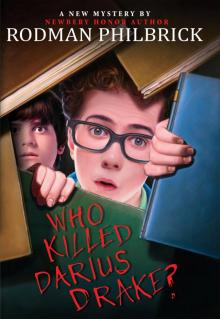 Who Killed Darius Drake?: A Mystery
Who Killed Darius Drake?: A Mystery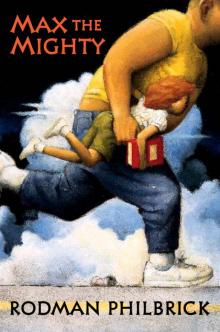 Max the Mighty
Max the Mighty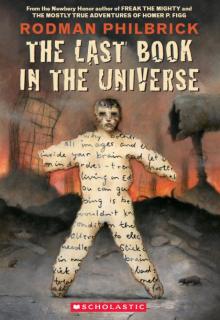 The Last Book in the Universe
The Last Book in the Universe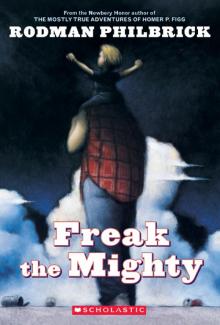 Freak the Mighty
Freak the Mighty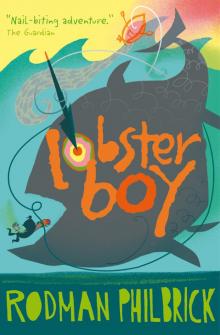 Lobster Boy
Lobster Boy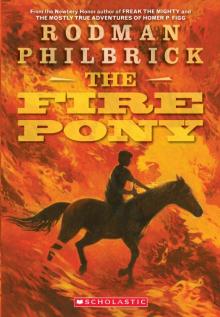 Fire Pony
Fire Pony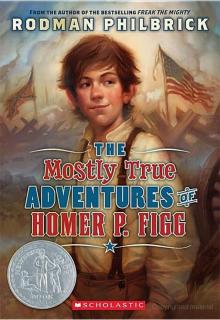 The Mostly True Adventures of Homer P. Figg
The Mostly True Adventures of Homer P. Figg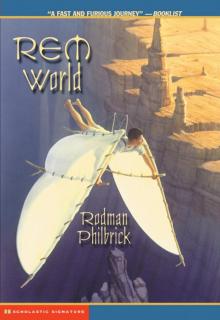 Rem World
Rem World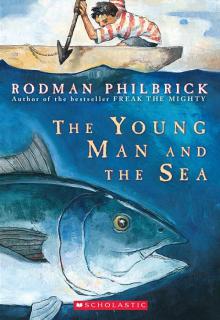 The Young Man and the Sea
The Young Man and the Sea Wildfire
Wildfire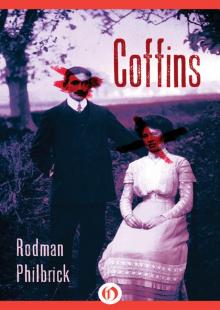 Coffins
Coffins The Big Dark
The Big Dark Strange Invaders
Strange Invaders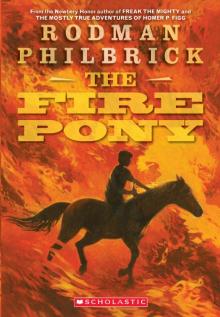 The Fire Pony
The Fire Pony The Haunting
The Haunting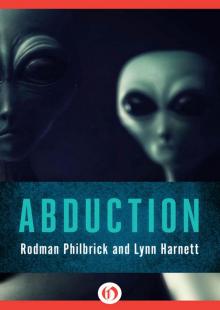 Abduction
Abduction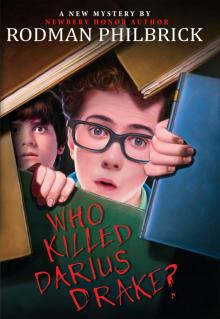 Who Killed Darius Drake?
Who Killed Darius Drake?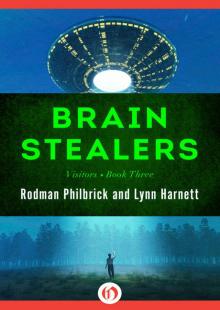 Brain Stealers
Brain Stealers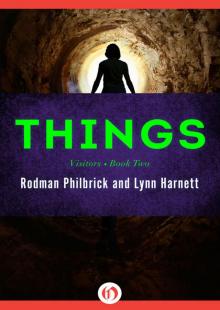 Things
Things Zane and the Hurricane
Zane and the Hurricane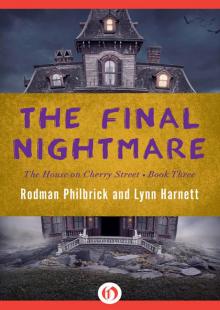 The Final Nightmare
The Final Nightmare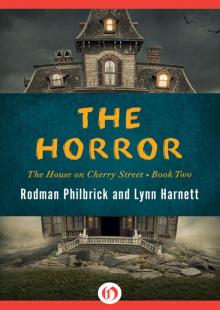 The Horror
The Horror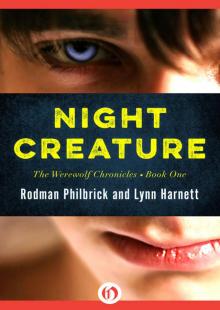 Night Creature
Night Creature Children of the Wolf
Children of the Wolf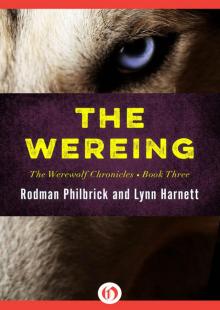 The Wereing
The Wereing